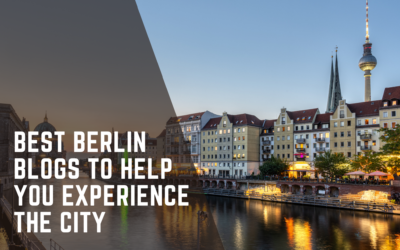WHY IT’S IMPORTANT TO LEARN GERMAN IN BERLIN
Some may find this a bold statement, but I stand by this 100% – you should learn German if you’re an English-speaking person living in Berlin.
As Berlin is such an international city, a lot of people seem to think that you don’t need to have a command of the German language in order to live in Berlin. I’ve read and watched countless and, unfortunately, very misleading articles and videos informing aspiring Berliners that understanding German isn’t necessary. Even worse are the complaints I’ve heard from fellow foreigners that Germans don’t know enough English.
To a certain extent, it’s true that you can get by speaking only English. I personally know people who’ve been in Germany for years and never bothered to learn German. They seem happy and perhaps it somehow works for them. Based on my own personal experience, I feel your Berlin experience is much richer if you can achieve at least a basic grasp of German.
My advice for aspiring and current Berliners is to learn German to the best of their ability. If you’re planning to stay in Berlin for anything beyond a brief vacation or a three-month tourist visa, it’s important that you make an effort to learn the language. Even just learning a little bit of German will go a long way. Learning German is also key for those looking to find a job in Berlin. It will not only substantially increase your chances of finding a job, but it will also set you apart from other candidates who are lagging behind on the language front.
If you’re wondering whether or not there are English speaking jobs in Berlin, read our guide to get the low-down.
Join Our Community
Stay ahead with the latest news on immigration developments, employment opportunities, and other updates about life in Germany. Get valuable insights, early access to Berlin Life guides, invites to community events, and more. Don’t miss out – subscribe to one of the most popular newsletters in Berlin.

REASONS TO LEARN GERMAN IN BERLIN
The first time I moved to Berlin, I didn’t make a proper effort to study German. It was due in part to not knowing if I wanted to stay in Berlin long term, balancing multiple freelance clients, and dealing with some personal issues. Moving home to Canada made me realize how much I missed Berlin and that most of my troubles during that time could be traced back to not knowing the language! As I knew I wanted to come back to Berlin again someday, I enrolled at the Goethe Institut in Toronto, eventually reaching the A1.2 level. My efforts were not in vain and really helped me upon moving back to Berlin. I can now better understand conversations happening around me and can get by in fairly simple situations.
However, I’m still at the beginning of my journey. Being able to read a restaurant menu and order in German isn’t enough. Unfortunately, I still have an irrational and intense fear of speaking German in front of other people, especially those I know. I need to get over it and jump back into the language-learning game again soon.
I can personally attest to the fact that there will be plenty of times when you absolutely need to know German in Berlin. Here are some scenarios that illustrate why learning German is pretty essential when living in Berlin.
1) At the Bank
When I moved back to Berlin in 2014, I went to my local Sparkasse to open a bank account. It turned out that none of the staff on duty could speak English and they didn’t feel comfortable helping me. They asked me to come back and helped me set up an appointment for the following week, with one of their younger bank tellers who did speak English.
Another time, when I was in Sofia, Bulgaria for the weekend, an ATM “ate my bank card for breakfast”. I had to enlist the help of a German-speaking friend to call Sparkasse and put a hold on my account until I could visit my home branch and order a new card.
Early on in the pandemic when we were in strict lockdown, my bank card stopped working and I needed to replace it. As I also needed some cash to get by while I waited on the new card, I went to one of the few bank branches that were open. I ended up having to go to a bank in Marzahn where there were no English speakers and like in 2014, they gave me an appointment for another day.
Even all these years later, there are still many people who cannot (or will not) speak English which shows how German is still critical for getting by in various situations like visiting a bank.
2) Government Offices
A really good reason to learn German in Berlin? The staff at government offices like the Ausländerbehörde, Bürgeramt, and Zollamt, usually only speak German – even though they deal with foreigners on a daily basis. In fact, they are instructed not to speak anything but German due to legal reasons.
If you’re lucky, you might get a friendly person who will be happy to speak with you in English, Spanish, Turkish, or something else, but you can’t count on this to happen. When I went to pick up my Blue Card in the summer of 2017, I was lucky to get a young guy who was only too happy to speak English (not that I expected this). He was kind, gave me advice on applying for my permanent residency, and even joked around with me. But a year later when did go to get my permanent residency, I ended up with a grumpy man who only spoke German and made me wait for a long 30 minutes while he did “something”. I spent that whole time shaking with fear he was going to deny my permit. It was approved, but the experience left me with a very negative feeling.
If you can’t speak German well, it’s a pretty good idea to bring a German speaker with you to your appointment. These appointment can be especially daunting for those who are new here and don’t know anyone. When I first arrived in Berlin, my landlord helped me by letting me hire her intern who came along with me to Burgeramt. Other times, I brought friends who were only too happy to help out. My hot tip? I find it especially useful to bring along friends who are easy-going and friendly, and more importantly, are capable of quickly charming the government employee. I feel like this always lends to you getting a favourable decision.
Depending on how many times you visit a government office, it’s either going to get very expensive or you’re going to annoy your friends who will tire of bailing you out all of the time. So learn German so you can deal with German bureaucracy on your own and like a pro.
3) Restaurants
Some restaurants only offer menus in German, and their wait staff may not be able to speak English very well or at all. Unless you have the time to run every dish on the menu through Google Translate or DeepL, there’s a good chance you’re going to frustrate the servers and be on the receiving end of bad service. Or you might be forced to order under pressure and end up selecting something random from the menu. When I first came to Berlin, I received many “surprise” dishes as a result of this happening.
4) Using Technology
Try troubleshooting a jammed printer that only has a menu in German. At work in Canada, I could handle printers like a pro. Here, I stare blankly at the screen and attempt to solve the problem by pushing random buttons (which always works) or opening up the printer looking for the jammed paper, getting toner ink all over myself in the process. Of course, I’d usually end up making the problem worse and frustrating my co-workers who had stuff to print as well. In the end, I had to beg for their assistance and, by their request, write down the step-by-step instructions to solve the problem on my own the next time. Not embarrassing at all.
Some companies don’t always have laptops with American keyboards. So instead of QWERTY, you get QWERTZ. While there are some workarounds you can employ, using a keyboard you’re not comfortable with is awkward as <bleep>. While learning German, it’s recommended that you also practice using a German keyboard so you can use it as effortlessly as you would another keyboard.
5) Interacting With Others
Another reason for learning German in Berlin? Not learning the language will actually make some locals dislike you (even though that’s totally not cool), and you may encounter some of that famous Berliner Schnauze.
When some Germans find out you’ve been here for years and haven’t bothered to learn the language, they may refuse to engage you in conversation and say unkind things like “typical American!” with a lot of disgust in their voice. A British girl I know from a neighborhood coffee shop, who actually speaks German fairly well, recently told me about how their delivery man spoke down to her and started lecturing her about her German not being good enough. Luckily, her German boss came to her defense by telling the old man to stop yelling at her, informing him that if he ever said anything like that again, his coffee shop would cancel their contract with the delivery company. It’s an unfortunate reality that you may have to deal with here, and there won’t always be a superhero boss around to come to your defense. And to be very clear, this is not the norm. Most Germans are very kind and friendly people, who’ll appreciate your willingness to try to learn their language.
If you’re like me, you’re also going to want to make friends with both fellow foreigners and locals. I can’t tell you how much my world opened up in Berlin after I became good friends with a small group of Germans. I’ve heard that dating one helps too. Having German friends is a good thing, but the bad part is that each time I get together with them, everyone still speaks English. It isn’t really nice on my part to expect that they adjust their behavior because of me so that’s another strong motivation to better my German.
Where To Learn German In Berlin
Learn German in Berlin at some of these schools:
1) Babylonia
2) Expath
3) GLS
5) speakeasy
We also recommend browsing our complete list of German language schools in Berlin.
We hope we’ve convinced you about why you should learn German in Berlin. We promise, it will truly make your life in the Hauptstadt that much better.
RELATED CONTENT
Best Berlin Blogs To Help You Experience The City
Keen to explore the city’s history, find a brunch spot, or get tips on finding a flat? These are the best Berlin blogs to get you started.
A Guide To The Cost Of Living In Berlin In 2024
A personal guide to the cost of living in Berlin. Learn what locals are paying & use our handy calculator to figure out your expenses.
Mail Forwarding In Germany – Send Post To Your New Address
Moving to a new flat or leaving Germany entirely? Don’t miss important documents & use Deutsche Post’s service for mail forwarding in Germany.

Cheryl Howard, Founder @ The Berlin Life
Hi, I’m Cheryl. My mission is to help you move to Berlin and find work.
A Canadian in Berlin for 10+ years, I have the unique experience of moving to Berlin – not once, but twice. During my time in Berlin, I’ve had five different visas and worked as both a freelancer and a permanent employee for numerous Berlin companies. I even managed to find a new job during the pandemic and again in 2023, during Germany’s recession and massive layoffs in tech.
My day job has involved work as a hiring manager, overseeing the recruitment of countless people, as well as a team coach helping teams and individuals work better and find happiness in their careers. Through my side projects, I’ve also shared my personal experiences by publishing a series of helpful blog posts, creating a thriving community of job seekers, and hosting events to help people find work in Berlin. In 2021, I decided to put my coaching and recruiting talents to use by creating The Berlin Life, bringing my existing content and community together in one spot.
The combination of my personal and professional experience means I know exactly what it takes to move to Berlin and find work.





Hallo, Cheryl!
Wie geht’s dir?
I totally agree with you on this! I’m actually passionate about learning new languages, so, for me, it’s a pleasure to learn German.
Btw, I’ve just pump into your blog while I was looking up for Berlin’s cost living guidance. And I’m already in love!
Thank you for sharing your experience with us! I’m moving to Berlin later this month and I can’t wait to live this experience! I’ll probably check out your blog again for more informations about Berlin.
Danke schön! Tchüss!
Fernanda 🙂
Hi Fernanda! Thank you for your kind words. We’re always happy to hear when we’ve helped someone. It’s also wonderful that you’re learning German and about to move in Berlin. I hope you will love it as much as I have. 💖 💫